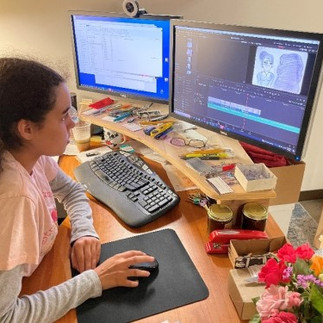Equipping Students with 21st-Century Skills with Story Xperiential
- Beth Ferrigno

- May 28, 2024
- 4 min read
Updated: Jun 14, 2024
In today's rapidly evolving job market, the need for 21st-century skills - creativity, problem-solving, and collaboration - is more critical than ever. Programs like Story Xperiential are at the forefront of this educational revolution, preparing students for future careers by fostering these essential skills.
Elyse Klaidman, CEO of X in a Box, says, “Storytelling is at the core of our humanity. It bridges the gap between people and teaches us empathy. Storytelling is critical in today's workplace, making it a core skill to teach.” Research shows that 21st-Century Skills are vital for success in modern workplaces, aligning with the framework emphasized by organizations such as the Partnership for 21st Century Learning (P21 Resources, 2019). Explore how this innovative program supports the development of these skills, backed by academic evidence and testimonials from those who have experienced its impact firsthand.
DEVELOPING CREATIVITY
Creativity is a cornerstone of 21st-century skills, and Story Xperiential nurtures this talent among students. Research indicates creative activities can significantly enhance cognitive development and innovation capabilities (Sawyer, 2011). Elyse Klaidman highlights the program's inclusive design, emphasizing that it is accessible to all students, regardless of their artistic background.
“We built a program with creativity and problem solving at the center. Story Xperiential is accessible to all students as we are all storytellers. You don't need artistic skills to excel - you just need an imagination.”
This sentiment is echoed by Marc Russo, who was drawn to teaching to help students discover their voices and develop their design skills. Russo says, "Story Xperiential is teaching visual storytelling, design, and communication skills to students all around the world. Through their program, they are encouraging students young and old to tell their stories."
ENHANCING PROBLEM-SOLVING ABILITIES
Solving complex problems is a vital skill in the 21st century. Studies have shown that problem-based learning environments significantly improve students' critical thinking and problem-solving skills (Hmelo-Silver, 2004). Story Xperiential provides students with numerous opportunities to develop this capability. Keri Putnam, former CEO at Sundance Institute, former executive vice president at HBO Films, and former president of the production at Miramax films, points out that the program mirrors real-life complexity, making it a powerful tool for learning. She explains, "Listening and collaboration and confidence of being able to put yourself out there and problem-solving, because often you think you have it and then you don't."
Matteo, a student from the first cohort, shares how the program pushed him to expand his ideas and tackle challenges creatively. He reflects, "I really found that Story Xperiential did a great job of not only giving you the foundational skills and allowing you to develop them, but giving you the freedom to expand past them and kind of develop your ideas based on how ambitious you are."

FOSTERING COLLABORATION
Collaboration is another essential 21st-century skill that Story Xperiential promotes effectively. Research supports the notion that collaborative learning enhances students' communication skills and social engagement (Johnson, Johnson, & Smith, 1998). The program's structure facilitates teamwork and peer feedback, creating a collaborative learning environment. Jorge Flores, Asst. Professor of Video and Media Art at Los Angeles City College and former middle and high school animation and digital arts teacher, describes how students worked in groups, pitched story ideas, and received feedback from their peers and industry professionals.
"People who were really quiet in the teams found their voices. They realized that their stories have power."
A CTE teacher, Sydney Barnett appreciates the program's flexibility and how it caters to different resource levels. She shares, "I've taught the program both with just paper and pencil. We recorded everything on our phone. And then the second semester, once I got my footing, we used Procreate and Krita and Wacom tablets."
PREPARING FOR FUTURE CAREERS
Story Xperiential equips students with marketable skills that are highly valued in today's job market by fostering creativity, problem-solving, and collaboration. Research indicates these skills are crucial for career readiness and adaptability in various professional settings (Silva, 2009). Ted Dintersmith, author and education change agent, emphasizes the real-world applicability of these skills.
"These students are getting good at something that is a very marketable skill. It's really powerful. If a student gets good at something they love, develops within the context of things that mean so much to them personally, but then they suddenly think, 'WHOA! I'm good at something that the world values!'" (Dintersmith)
CONCLUSION
Story Xperiential is not just an educational program; it is a transformative experience that prepares students for the demands of the 21st century. By developing creativity, enhancing problem-solving abilities, and fostering collaboration, it equips students with the skills they need to succeed in a rapidly changing world. Join us in empowering the next generation of thinkers, creators, and problem-solvers with Story Xperiential.
For more information about Story Xperiential and how it can benefit your students, visit our website or contact us today.
REFERENCES
Hmelo-Silver, C. E. (2004). Problem-based learning: What and how do students learn?. Educational psychology review, 16, 235-266.
Johnson, D. W., Johnson, R. T., & Smith, K. A. (1998). Cooperative learning returns to college what evidence is there that it works?. Change: the magazine of higher learning, 30(4), 26-35.
P21 resources: 21st Century learning resources. Battelle for Kids (2019). (Retrieved 2024, January 8). https://www.battelleforkids.org/insights/p21-resources/
Sawyer, R. K., & Henriksen, D. (2024). Explaining creativity: The science of human innovation. Oxford university press.
Silva, E. (2009). Measuring skills for 21st-century learning. Phi delta kappan, 90(9), 630-634.





















Comments